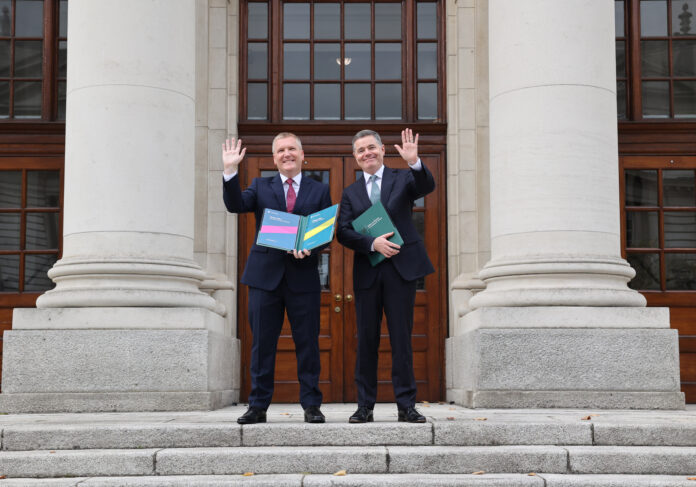
MEASURES announced in this week’s Budget won’t have a substantial impact for working people, according to Limerick Chamber.
Finance Minister Michael McGrath announced a budget package of €14billion on Tuesday (October 10) to help people as the cost of living remains stubbornly high.
However, speaking at Limerick Chamber’s annual post-budget briefing, in conjunction with PwC, Seán Golden, Chief Economist and Director of Policy with the Chamber, said the measures won’t make a massive difference to the lives of working people.
“Is it going to have any substantial impact on working people’s lives? No, is really the answer,” Mr Golden told the Limerick Post.
“If someone is on the average salary, they might get an extra €15 a week, that won’t buy a box of fags,” he said.
A reduction in the Universal Social Charge (USC) was announced, as well as changes to the income threshold for the top rate of tax.
The entry point for the top rate of tax will rise from €40,000 to €42,000.
The Government announced that the rate of USC that workers pay will drop from 4.5 per cent to four per cent, while PAYE tax credits will increase by €100.
The Government also announced that the weekly core rate of all social welfare payments will rise by €12 per week, starting in January, meaning those on a state pension, jobseekers allowance, and disability allowance will all see their weekly payments rise.
There will also be a double payment of social welfare in January, as well as the Christmas bonus to be paid in December.
A double payment was announced for recipients of the child benefit, and extra bonuses for those on other welfare payments in January.
The Government stated that delivering social housing was a top priority, however, according to the Chamber, “the dial needs to be shifted” to deliver more homes for workers as well.
“Did I see anything in the Budget that would give a greater indication that housing next year is going to be better than it was for the last two years? The answer is unfortunately no,” Mr Golden said.
“I think the dial needs to be shifted in terms of prioritising worker affordable housing – that doesn’t seem to be the case for another year, so ultimately, not really.”
The renters credit will be increased from €500 to €750 to help renters cope with the high cost of rent.
A landlords tax credit will also be introduced in an attempt to stop private landlords from leaving the market, but the Chamber feel that this won’t have as strong an impact as hoped.
“You might have thought beforehand that the landlords tax credit might’ve encouraged more people to be landlords, but it’s quite small. I can’t see it encouraging anyone to be a landlord really.
“In the first year you might get €600 back, which is likely not even to cover your mortgage,” Mr Golden explained.
The minimum wage will rise by €1.40, bringing it up to €12.70 an hour.
Mortgage holders will also benefit with a €1,250 tax relief announced for those who have been hit by interest rate hikes imposed by the European Central Bank (ECB).
Two new funds will be set up to support Ireland into the future, the Future Ireland Fund and the Infrastructure, Climate, and Nature Fund, which is “one of the good things” to come out of the budget, the Chamber say.
“One of the good things, to be fair, that came out of the budget was setting up of the funds into the future.”
“Ireland, late to the game but better late than never, so that means, going forward, if we invest that money appropriately and don’t touch it, when times get tough we might have a bit of a stronger crutch to lean on than what we had in 2008,” Mr Golden explained.
Parents will also see childcare costs cut by an average of 25 per cent, however this won’t take affect until September 2024.
Households will also get a total of €450 worth of energy credits, paid in three €150 instalments.
A free schoolbooks scheme for secondary school students up to the Junior Cert will be introduced by Education Minister Norma Foley, meaning first, second, and third year students will receive free schoolbooks from September 2024.
Free copybooks, calculators, dictionaries, and other classroom items will also form part of this scheme.
There will be a once-off reduction in the student contribution fee of €1,000 for third level students.
Excise duty on petrol and diesel won’t see any increases, while a planned increase of excise duties that was due to take effect from the end of October will also be delayed.
A packet of 20 cigarettes will increase by 75c, while there will be no increase to the cost of alcohol.
In an effort to tackle anti-social behaviour, there will be a 25 per cent increase in Garda overtime, with funding to increase from €105million to €135million, a measure that the Chamber’s members have been calling for.
“A lot of our members in the city centre might say ‘we want more police on the street’, now the Budget allocated money for 1,000 more police, but is the city centre going to get them and are they going to be visible?” Mr Golden said.
“On one side of the coin, businesses want more support, but on the other side of the coin, they want more housing, better transport, and better visibility for policing, so it’s not just about either/or, it’s really about both.”
“Again, it’s back to the implementation, plenty of money around, it was a big old Budget, but are we going to be able to implement it and meet the ambition that government actually had? I’m not too sure, there’s a lot of constraints in the system.” Mr Golden concluded.









